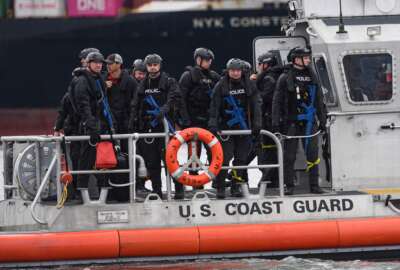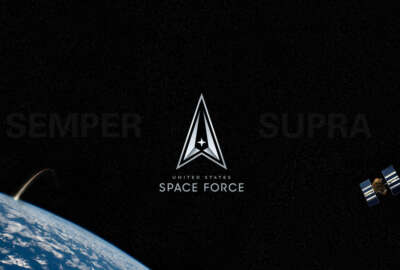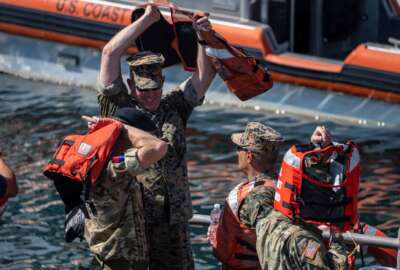Hubbard Radio Washington DC, LLC. All rights reserved. This website is not intended for users located within the European Economic Area.
Why was a Space Force guardian aboard a Coast Guard Arctic cutter?
Talk about joint service. A member of the Space Force has become the first guardian to receive a service medal from the Coast Guard. The guardian spent three we...
Talk about joint service. A member of the Space Force has become the first guardian to receive a service medal from the Coast Guard. The guardian spent three weeks aboard the Coast Guard Cutter Healy in the Arctic. It’s cold up there. To kind out how cold, and much more, the Federal Drive with Tom Temin spoke with that guardian, Capt. Henry Cho.
Interview Transcript:
Henry Cho So I was there to monitor our experiment. So the Coast Guard offers slots on the Coast Guard cutter Healy that’s the ship’s name, to conduct experiments on board. And part of their primary mission is to do science along with diving and rescue qualifications. So they regularly host scientists parties, so we were just one of those parties. There were other researchers from NASA Naval Research Lab, also the Johns Hopkins Applied Physics Lab. So our experiment was ionospheric sounder. So we made measurements of the ionosphere, which is an atmosphere layer that contains ions and electrons. We used an active antenna to transmit up and then another antenna to measure the return signal, and that measures the strength of the ionosphere. And the reason that we care about it is because ionosphere has radio properties, meaning we can bounce radio signals off of it. So that’s relevant for communications, for both ground communications or radio, but also space communications like SATCOM and GPS.
Tom Temin Right. So Space Force has dominion over the satellites, and you want to make sure the signals can get through all of the atmosphere, including the ionosphere then.
Henry Cho Right. So because ionosphere has both the properties of electrons where you can bounce radio signals, it also introduces delay for like satellite communications. So we want to account for that. And part of the research that we’re doing is to make measurements of the ionosphere, to know when it’s stronger, when it’s weaker.
Tom Temin And this can’t be done via satellite, looking at it from the top instead of the bottom?
Henry Cho No. So we don’t know about how strong the ionosphere is in the Arctic region. And that’s one of the reasons why we were on board the cutter to make measurements of the ionosphere.
Tom Temin And is the polar zone important because of the way the satellites orbit?
Henry Cho Well, the polar region is important for a number of reasons. One of them is like for polar orbits. Another reason is because of climate change and how the polar ice caps are melting. There’s increased activity up in the polar region. And so we’re also interested in monitoring that region.
Tom Temin Right. Because Russia and everybody else is prowling around there, too. And the United States needs to have a strategic presence and a reliable one, I guess, too, in the Arctic. Fair to say.
Henry Cho Right. There is increased activity from both Russia and China, both military and commercial.
Tom Temin And for the Space Force, you specialize in atmospheric characterization generally, correct?
Henry Cho Right. So I’m assigned to Kirtland Air Force Base as a researcher, and a lot of the experiments that we run here is for atmospheric characterization. So we’re looking at making measurements, not just the ionosphere, but also like the weather, both terrestrial and space weather. So how solar activity affects the atmosphere. So we’re looking at both the atmosphere based on terrestrial and space weather.
Tom Temin We’re speaking with Captain Henry Cho of the Space Force. And tell us about life on the cutter in the Arctic. These are not tiny little boats. They’re good sized ships. What was life like aboard there?
Henry Cho This was a Coast Guard cutter Healy, which is I believe was one of their larger ships, but relatively to naval ships, I think. It’s relatively small. But life is generally very simple on board a cutter. It’s not just wake up. And so my duties were just to monitor and make sure our experiment was running ok. And that takes about really about 30 minutes out of my day. And so most of your time is really just keeping up with your health because the demands of going out into the Arctic, both living in an enclosed area and then living, working, sleeping in that enclosed area, were both like moldy bacteria or the food progressively gets worse because all the fresh food runs out in the first half and then the second half you’re eating the frozen foods. And then on top of that, some nights you don’t get a good night’s sleep because of heavy waters in the rocky of the boat. And also there’s a foghorn that goes off every 30s to alert other ships to make sure that there’s no collisions.
Tom Temin Yes. Sounds like a total joy aboard the Coast Guard cutter. But otherwise, the Coast Guard people were accommodating for you with a sister force, you might say.
Henry Cho Right. Yeah. They regularly do these science missions. So I think you can host up to 50 scientists. And so there are a lot of other governments and commercial partners that they offer seats to. But yeah, they do this all the time. They understand the demands of like be on board. So they certainly make time for people to get their sleep in.
Tom Temin Is there a treadmill and a set, a weight room, that kind of thing on there?
Henry Cho Yes. There is, I guess, two gyms on board. But an interesting thing about treadmill is on the ship. Essentially, the floor is always moving because of the heavy waters. And so, like running on a treadmill is very interesting because you have to balance yourself with the rocking waters.
Tom Temin Yeah, I’ve done it. It’s even worse trying to stand on a bosu ball and the balance things when you’re on a ship that’s rocking in the ocean. Well, tell us about your career, how you came to be an atmospheric characterization specialist. That’s my word, not yours.
Henry Cho So I commissioned into the Air Force in 2016 for officer training school. And that was after college. I did an undergrad in aerospace engineering, and I was picked up as an engineer to be in the Air Force. My first assignment was at the program office, so that was overseeing production on TV and satellites. And then after that, I was picked up for graduate school at the Air Force Institute of Technology. And there I earned an engineering master’s in electrical engineering. And then I was also the assignment that I could transfer into the Space Force just because I had a strong space background. But it made sense to transfer over. And then non stationed here at Air Force Research Lab and I work as a researcher. My career field, they essentially grow either program managers or technical talent and I tend to lean on the technical side of things. So that’s how I ended up in this position.
Tom Temin And where will you have to go next? On the surface, to be able to measure the atmosphere?
Henry Cho Well, right now we were debating whether we do another experiment again on the Coast Guard cutter Healy. And we’re not entirely sure, like, what different thing we would do because we don’t want to collect the same data over again. So we’re discussing whether we would do the same prep again and what we would do differently.
Tom Temin Sure. And this time you would bring a fresh crate of oranges all of your own, I suppose.
Henry Cho The voyage was about 40 days. And yeah, I suppose it would last.
Tom Temin Yeah. But you did get a medal from the Coast Guard or from the Space Force.
Henry Cho So it is a Coast Guard battle. I was looking for in the shop here at Kirtland and will offer it. So I’m glad to have the medal up in our base up in Alaska.
Tom Temin Yeah, well, maybe next time you’ll cruise the Caribbean.
Henry Cho Yeah. I mean, the cutter does go in different parts of the world. I’m not sure they would actually go through the Caribbean and maybe through the Panama Canal.
Copyright © 2024 Federal News Network. All rights reserved. This website is not intended for users located within the European Economic Area.
Tom Temin
Tom Temin is host of the Federal Drive and has been providing insight on federal technology and management issues for more than 30 years.
Follow @tteminWFED





